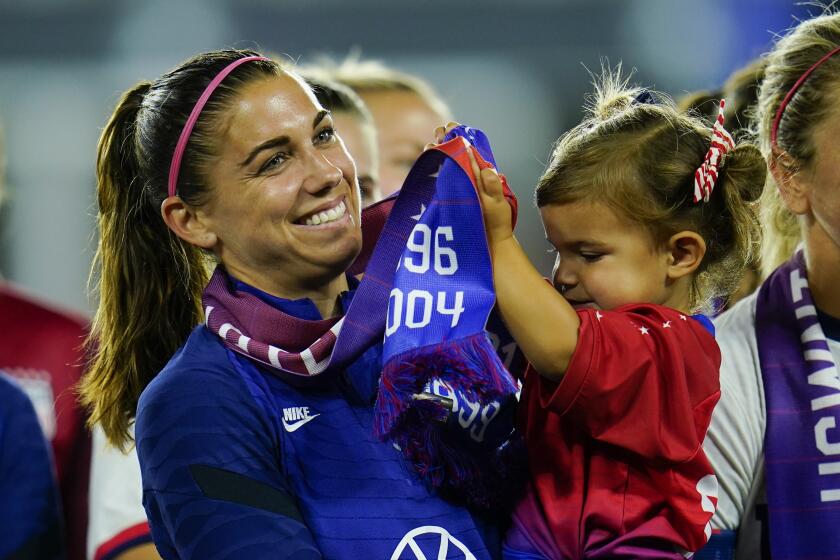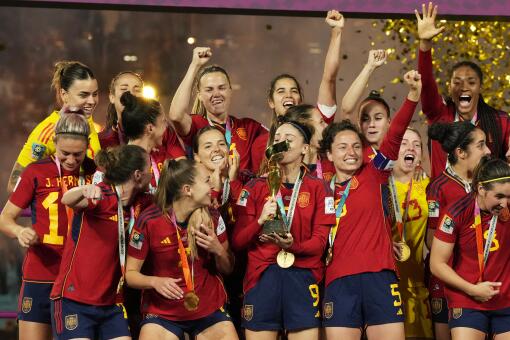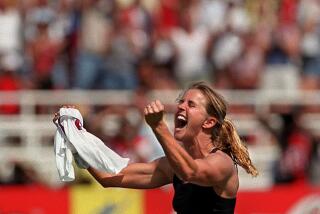Commentary: ‘I don’t have any regrets.’ Megan Rapinoe leaves a career that changed the world
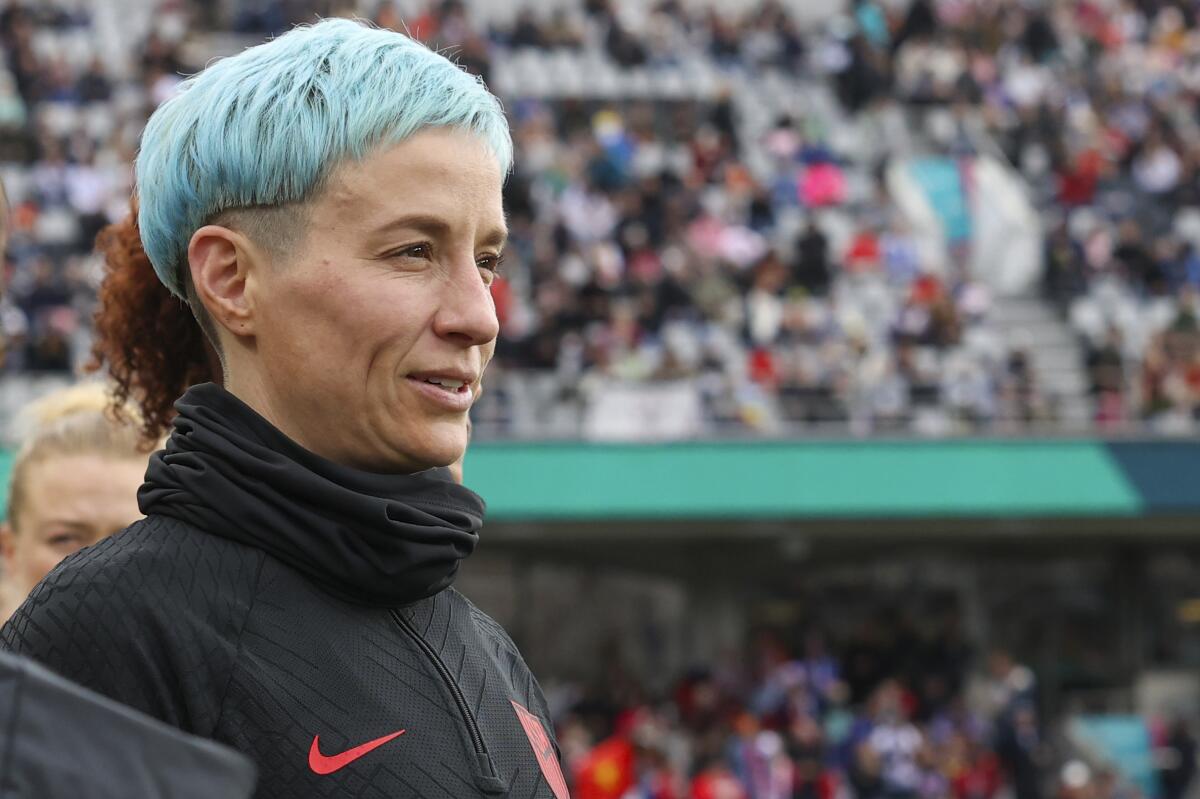
- Share via
AUCKLAND, New Zealand — Megan Rapinoe has always danced to the beat of a different drummer.
If you don’t believe that, consider the meeting she held with the World Cup media on Sunday. Rapinoe showed up in a dark blue national team hoodie wearing zebra-striped sunglasses beneath close-cropped hair dyed turquoise. Her fingernails were painted black.
She also brought the engaging smile and the playful attitude that is as much a part of her game as precision free kicks. So although the first 11 news conferences U.S. Soccer held in New Zealand featured two people, Rapinoe sat behind the dais alone. Fittingly, the stage was all hers.
Rapinoe will play her last competitive game for the national team in this World Cup. In fact, that might have happened. Coach Vlatko Andonovski used her for 27 minutes off the bench in the U.S. win over Vietnam, then not at all in a draw with the Netherlands.
“He knows I want to go in the game,” she said on the eve of Tuesday’s decisive group-play final with Portugal. “Every single sub wants to go in the game.”
Yet not every sub is Megan Rapinoe. And when she walks off the field for the last time it will be the end of the most remarkable and transformative era in U.S. soccer history, one that has seen the women’s team capture consecutive World Cups and an Olympic gold medal, and win a seven-year fight with its own federation for equal pay and working conditions.
Goaded by the U.S. team’s activism, even the hidebound bureaucrats at FIFA have increased their support for the women’s game — and they’ve been rewarded this summer by the most compelling and competitive women’s World Cup ever.
A look at how Alex Morgan, Crystal Dunn and Julie Ertz had the support of U.S. Soccer, coaches and teammates to become moms while continuing careers.
Rapinoe’s fingerprints are on all those advances.
The women’s national team has built a culture and tradition in which its excellence and attitude is passed down from generation to generation. It’s an unbroken chain that has gone from Mia Hamm and Julie Foudy to Abby Wambach and Carli Lloyd to Alex Morgan and Rapinoe, with one woman replaced by the next.
Rapinoe, however, may be irreplaceable.
She has played in four World Cups and won two of them. She won the World Cup’s Golden Boot and Golden Ball in 2019, when she was also named FIFA’s player of the year. Germany’s Birgit Prinz is the only other player in history to accomplish the same.
She’s played in 200 games, scored 63 goals and recorded 73 assists. In U.S. Soccer history, only Hamm, Wambach and Kristine Lilly have done that.
But if Rapinoe, 38, has changed the game, she’s also changed the world around it. What sets her apart is what she’s done away from the field, where she’s taken a stand for gender equality and LGBTQ+ rights and taken a knee against racism and police brutality. She has spoken out for social change, spoken up for at-risk children and spoken in favor of same-sex marriage. On the opening night of the last Democratic National Convention, she hosted a panel with frontline workers who were battling the COVID-19 pandemic.
While her activism made her the only soccer player to receive the Presidential Medal of Freedom and landed her on Time magazine’s list of the world’s 100 most influential people, it also led to hate mail, vile attacks on social media and demands that she just shut up and dribble. Then-President Trump attacked her on Twitter during the 2019 World Cup, which ended with Rapinoe carrying three trophies off the field in France.
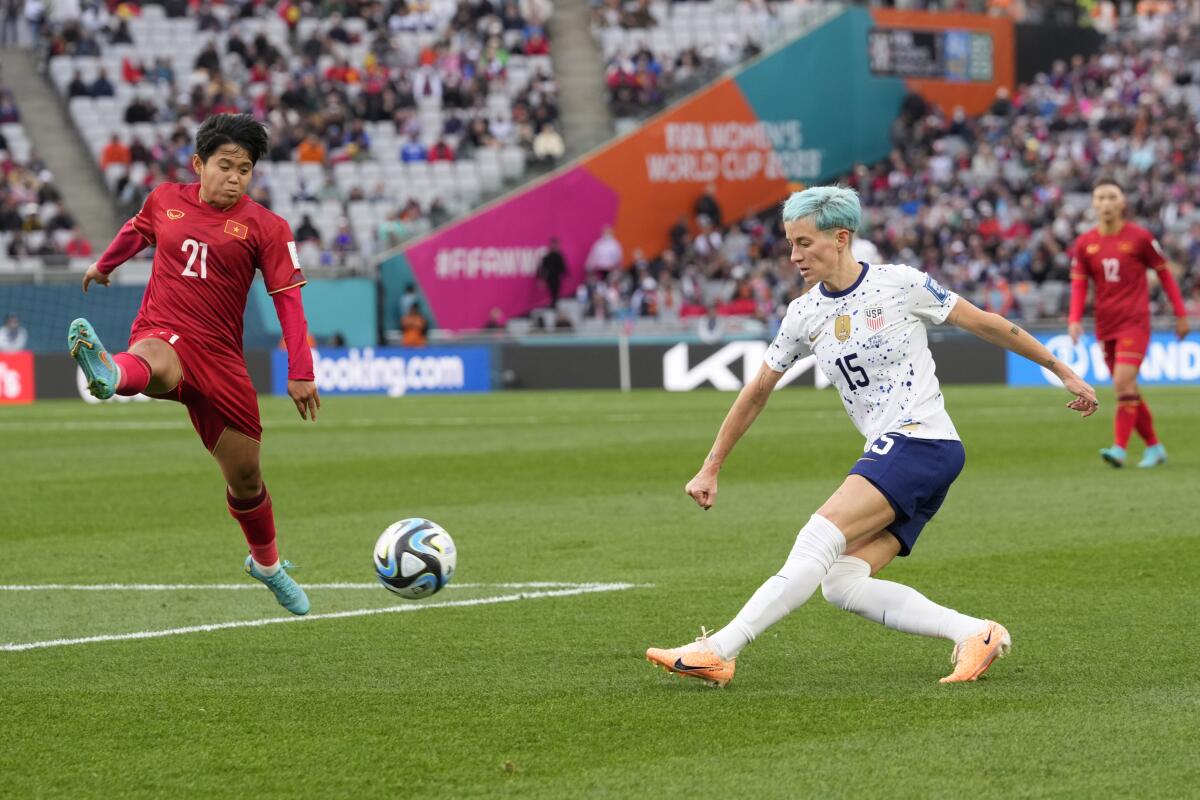
“I don’t have any regrets,” she said Sunday. “I don’t think I really would have done anything differently. I think I did always the best and the most I could with what I knew and what I had at the time.”
Rapinoe is well aware that her work as an activist was built on her success as an athlete. No one listens to the woman who finished second. The women’s national team has long had a platform because it’s the most successful team in the history of the sport. And for Rapinoe, like Hamm and Foudy before her, there’s no point in mounting that platform if you have nothing to say.
“Without the winning, you don’t get all these microphones. Without the winning, you don’t get the platform,” she said. “Without the winning, you don’t get the media, you don’t get the eyes, you don’t get the fans, you don’t get the ability to say what you want.
“That’s been a huge part, honestly, of this team forever. We’ve always been successful. And we’ve always used that platform and people wanting to talk to us.”
None has used it as long and as effectively as Rapinoe.
She began her national team career at a time when there was no prize money in the women’s World Cup, players slept two to a room and shared their hotels with opposing teams. They sometimes traveled by bus.
She’s leaving during a World Cup in which $152 million will be shared among a record 32 teams, players have their own rooms at five-star resorts and they travel on charter flights. After a bitter fight with U.S. Soccer that wound up in court, the American women are now guaranteed the same pay, accommodations and staffing as the men’s team.
More quietly, outside of the spotlight, Rapinoe has pledged part of her salary to sport-centered charities around the world, worked with the ACLU, partnered with the Boys and Girls Clubs in Seattle, where she plays club soccer, and raised money for victims of a devastating wildfire near her childhood home in Redding.
Sometime later this year Megan Rapinoe will stop being a soccer player at the conclusion of the NWSL season, but she’ll never stop being herself. There will be no more games, no more practices, no more World Cups. But there will always be wrongs to right, causes to champion and injustices to protest.
So, Rapinoe was asked, what is her legacy?
“I’ve always tried to play the game the right way and to go about things the right way,” she said. “I’ve always tried to use whatever platform we have — and this platform, obviously, was built long before I got here. We just continued to add to it, to grow the game, make the world a better place. Use our voices to advocate for more.
“Being a women’s professional athlete, we sort of know what the injustice is, or at least that we have felt. It makes it easy for us to then be an ally in other ways. I think that’s the real legacy, the most important legacy of this team. We’ve been able to do something really special, couple[d] with being incredibly successful over a long period of time. So I don’t know exactly what all that means to everyone but for me, I know that I will walk away having gotten everything out of it that I possibly could and enjoyed every moment and celebrated and fought and kind of just laid it all out there.”
And both her sport and the world she touched are better because of that.
For the record:
7:32 p.m. July 30, 2023An earlier version of this story stated Megan Rapinoe is the only woman to win two World Cups, the World Cup’s Golden Boot and Golden Ball and be named a FIFA player of the year. Germany’s Birgit Prinz also has accomplished those feats.

